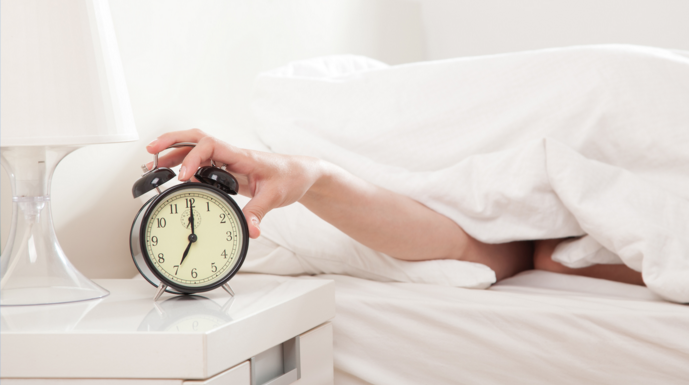Everyday ‘unhealthy’ habits that aren’t too bad after all

We are always either trying to drop or pick up habits in pursuit of a better a better life. What if I told you that some of the things you love to do can actually make you burst in good health despite being listed as abominable. Chewing gum, oversleeping during weekends and even biting your nails isn’t so disgraceful. Even better, you don’t have to force yourself into things you dislike or find tedious; not to mention regular workout for those unmotivated in that area. Let’s now get down to business.
1. Sleeping in on weekends
You can’t make up for too little sleep during the week…or can you? Sleep science experts have claimed that snoozing till noon will mess with your circadian rhythms and increase your likelihood of developing diabetes and heart disease. However, Swedish researchers found some surprising benefits when people catch up on their sleep.
People under 65 who got less sleep on weekdays and more sleep during the weekends lived as long as people who got a dreamy seven hours of sleep every night. When elderly folks got less sleep and didn’t make up for it on the weekend, they were 50 per cent less likely to live as long.
2. Exercise when you’re tired
After a long, exhausting workday, exercising sounds like the last thing you’d want to do, but getting your sweat on will actually energise you. Fatigue along with mood and depression improved after a single 30-minute moderate intensity exercise session, according to a study published in Medicine and Science in Sports and Exercise. Everything we do uses oxygen, so when you exercise, it helps you work more efficiently and you don’t tire as easily.
3. For healthy teeth, don’t brush immediately after eating
Don’t brush your teeth immediately after meals and drinks, especially if they were acidic. Acidic foods such as citrus fruits, sports drinks, tomatoes and soda can soften tooth enamel. Brushing your teeth at this stage can speed up acid’s effect on your enamel and erode the layer underneath. Wait 30 to 60 minutes before brushing.
4. Can’t stop biting your nails? You’re fine
Your hands are covered in germs, so you definitely don’t want to go overboard with this one. However, biting your nails could actually help you relieve stress and anxiety. It’s a much better coping mechanism than smoking or enjoying beer a little too much, anyway. If you’re a nail-biter, and prone to anxiety, just make sure to wash your hands more often than you think you need to.
5. Chewing gum isn’t that terrible
Well, the sweetened stuff is actually bad for you, since it can increase your risk for cavities. But if you go sugar-free, you may actually reduce that risk as well as slow the build-up of plaque. Your brain might also benefit.
According to British researchers at Cardiff University, chewing gum can help you focus on tasks that require continuous monitoring for longer periods of time, as well as improve your reaction time and accuracy. Other studies show that chewing gum can help your alertness and mood while dealing with stress, as well as reduce levels of the stress hormone cortisol.
6. One for the road isn’t that bad
You may have heard about the benefits of drinking wine…but beer? There’s a growing body of evidence that a moderate amount of beer can help with a host of health issues, according to Men’s Health.
Various studies show that beer can lower your risk of cardiovascular disease, type 2 diabetes, and kidney stones, as well as prevent cataracts and strengthen bones. One big, fat caveat: In nearly every study, scientists note that benefits come from averaging about a beer a day; too much more than that can be very unhealthy.
7. Drink a hot beverage to cool off
The first instinct when feeling hot is to drink a cold glass of water, but two recent studies say hot tea or coffee could cool you off faster than ice-cold water. When you sip a hot beverage, your body senses the change in temperature and increases your sweat production. Then, as the sweat evaporates from your skin, you cool off naturally.
8. Stressing out is good for you
Stop stressing about the fact that you’re stressing. According to a study from the University of California, Berkeley, a moderate amount of stress over a limited time period is motivating and can push you just to the level of optimal alertness and behavioural and cognitive performance.
Other studies have suggested that the effects of stress are mitigated by perspective. For example, when people think of stress as a challenge instead of a threat, they can act in more constructive ways and also experience fewer negative physical repercussions.
9. Not working out everyday is good
You might feel guilty for skipping the gym for a day or two, but you shouldn’t. When you don’t take the time to rest and instead overtrain, your muscles don’t have time to repair themselves properly and you could injure yourself or hit a weight-loss plateau.
When people exercise more than seven-and-a-half hours per week, they’re 86 per cent more likely to develop coronary artery calcification, a build-up of plaque in the arteries, and twice as likely to develop heart disease than men who are moderate exercisers.
10. Ditch antibacterial soap to prevent illness
Reaching for the soap bottle labelled ‘antibacterial’ won’t necessarily reduce your risk of getting sick or passing illness to others, in fact, there is no evidence that antibacterial soaps are more effective than regular ones. What’s more, long-term exposure to some ingredients in these products, such as triclosan, may pose health risks such as bacterial resistance or hormonal effects.
So don’t feel guilty if you ever find yourself engaging in the above.














